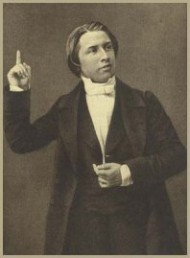Justin Taylor's Blog, page 327
May 22, 2011
Bringing the Gospel Home
Dane Ortlund interviews Randy Newman about his new book Bringing the Gospel Home: Witnessing to Family Members, Close Friends, and Others Who Know You Well (Crossway). You can read the table of contents and introduction online for free.
On Enjoying Not Envying Our Heroes in the Faith
 John Piper on Charles Spurgeon and his mind-boggling productivity for the gospel:
John Piper on Charles Spurgeon and his mind-boggling productivity for the gospel:
What shall we make of such a man?
Neither a god nor a goal.
He should not be worshiped or envied.
He is too small for the one and too big for the other.
If we worship such men, we are idolaters.
If we envy them, we are fools.
Mountains are not meant to be envied. They are meant to be marveled at for the sake of their Maker. They are mountains of God. . . .
We are to benefit from them without craving to be like them. When we learn this, we can relax and enjoy them. . . .
Let us be, by the grace of God, all that we can be for the glory of God (1 Corinthians 15:10). In our smallness, let not become smaller by envy, but rather larger by humble admiration and gratitude for the gifts of others.
—John Piper, "Mountains Are Not Meant to Envy: Awed Thoughts on Charles Spurgeon," in A Godward Life (Sisters, OR: Multnomah, 1997), pp. 264-265.
A Letter to Those Who Expected the Rapture Last Weekend
Here is a good and wise letter from Timothy Dalrymple to those are dealing with the aftermath of being misled and deceived about what the Bible teaches about the Judgment. Dalrymple looks at what can be affirmed and what can be learned.
(The only qualifier I'd offer is that Mr. Camping is not simply a well-intention but mistaken teacher. In addition to his end-time pronouncements, he has also been arguing for years, according to this careful critique, that "the institutional church, guilty of apostasy, should disband, ceasing its clerical ministries and its administration of the sacraments." Sad to say, the man is guilty not only of this false teaching, but is a false teacher.)
May 21, 2011
Elyse Fitzpatrick on Gospel-Centered Parenting
Elyse Fitzpatrick talks with Scott Anderson about her new book Give Them Grace: Dazzling Your Kids with the Love of Jesus (Crossway):
1:34 — Elyse shares about how she came to faith in Jesus.
6:50 — Elyse explains her call into biblical counseling.
15:50 — Elyse talks about her recovery of the gospel in giving counsel.
21:04 — Elyse begins to talk about the circumstances and content of her latest book.
May 20, 2011
The Pastoral Challenge and Opportunity When the Rapture Doesn't Happen
Some wise words from Eric Landry:
We must be very careful about how we respond. Will we join our friends at the "Rapture Parties" that are planned for pubs and living rooms around the nation? Will we laugh at those who have spent the last several months of their lives dedicated to a true but untimely belief? What will we say on Saturday night or Sunday morning?
History teaches us that previous generations caught up in eschatological fervor often fell away from Christ when their deeply held beliefs about the end of the world didn't pan out. While Camping must answer for his false teaching at the end of the age, Reformational Christians are facing a pastoral problem come Sunday morning: how can we apply the salve of the Gospel to the wounded sheep who will be wandering aimlessly, having discovered that what they thought was true (so true they were willing to upend their lives over it) was not? If this isn't true, they might reason, then what other deeply held beliefs and convictions and doctrines and hopes might not be true?
It's at this point that we need to be ready to provide a reasonable defense of our reasonable faith. Christianity is not founded upon some complex Bible code that needs years of analysis to reveal its secret. Christianity is about a man who claimed to be God, who died in full public view as a criminal, and was inexplicably raised from the dead three days later appearing to a multitude of witnesses. When his followers, who witnessed his resurrection, began speaking of it publicly, they connected the prophecies of the Old Testament to the life and death and resurrection of this man who claimed the power to forgive sins. This is the heart of the Christian faith, the message that deserves to be featured on billboards, sides of buses, and pamphlets all over the world. It is also the message that needs to be reinvested into the hearts and lives of those who found hope and meaning in Harold Camping's latest bad idea.
The Abolition of Man
 In the introduction to his fine work, What We Can't Not Know: A Guide, J. Budziszewski says that C. S. Lewis's little book The Abolition of Man is "perhaps the greatest work on natural law in the twentieth century." (He also adds that "most scholars of natural law have never heard of it.")
In the introduction to his fine work, What We Can't Not Know: A Guide, J. Budziszewski says that C. S. Lewis's little book The Abolition of Man is "perhaps the greatest work on natural law in the twentieth century." (He also adds that "most scholars of natural law have never heard of it.")
Perhaps the most famous line is his lament of the modern educational system producing "men without chests":
It is not excess of thought but defect of fertile and generous emotion that marks them out. Their heads are no bigger than the ordinary: it is the atrophy of the chest beneath that makes them seem so.
In rereading the book a few years ago I wished for a new edition of the book with a good introduction, outline, and notes. Well, we'll have to keep waiting for such an edition, but in the meantime, here's a very helpful 13-page handout on "An Introduction to and Themes from C. S. Lewis's The Abolition of Man" by Professor David Naugle of Dallas Baptist University.
(See also his lecture "Trousered Apes, Urban Blockheads, Men Without Chests: C. S. Lewis's Philosophy of Education in The Abolition of Man.")
Sex as a Sign and Appetizer of Something More
A most provocative sentence in Bruce Marshall's novel The World, the Flesh, and Father Smith (1944):
The young man who rings the bell at the brothel is unconsciously looking for God.
I think Peter Kreeft is on the right track in his analysis:
I think a secularist has only one substitute left for God, only one experience in a desacrilized world that still gives him something like the mystical, self-transcending thrill of ecstasy that God designed all souls to have forever, and to long for until they have it. Unless he is a surfer, that experience has to be sex. We're designed for more than happiness; we're designed for joy. Aquinas writes, with simple logic, "Man cannot live without joy. That is why one deprived of true spiritual joys must spill over to carnal pleasures."
Drugs and alcohol are attractive because they claim to feed the same need. The lack the ontological greatness of sex, but they provide the same semi-mystical thrill: the transcendence of reason and self-consciousness. I do not mean this merely as moral condemnation, but as psychological analysis.
In fact, though they sound shocking, I think the addict is closer to the deepest truth than the mere moralist. He is looking for the very best thing in some of the very worst places. His demand for a state in which he transcends morality is very wrong, but it's also very right. For we are designed for something beyond morality, something in which morality will be transformed. Mystical union with God. Sex is a sign and appetizer of that.
Moral absolutists must never forget that morality, though absolute, is not ultimate. It is not our Summum Bonum. Sinai is not the Promised Land; Jerusalem is. And in the New Jerusalem, what finally happens as the last chapter of human history is a wedding between the Lamb and His bride. Deprived of this Jerusalem, we must buy into Babylon. If we do not worship God, we will worship idols, for we are by nature worshippers.
Is Bavinck Relevant for Today?
 Thanks to Tony Reinke for digging up Carl Trueman's June 2000 editorial for Themelios (not previously online) on "The Advantages of Going Dutch." An excerpt:
Thanks to Tony Reinke for digging up Carl Trueman's June 2000 editorial for Themelios (not previously online) on "The Advantages of Going Dutch." An excerpt:
In conversation with theological students around the country, it often seems to me that one major problem faced by many is the development of a way of thinking theologically which neither retreats into a ghetto and adopts a 'seek out and destroy' mentality towards every new idea which crosses their path, nor capitulates unconditionally at the first objection to their faith which they cannot immediately answer.
Such students need their theological confidence boosted by good role models of a kind provided neither by the tunnel-vision of the specialist scholars who epitomise the fragmented nature of the theological discipline today, nor the platitudes of self-appointed evangelical gurus whose latest blockbuster tells them what they know already.
What they really need to do is to read someone like Bavinck. . . .
You can read the whole editorial here. Richard Gaffin says that Bavinck's four-volume Reformed Dogmatics set is "arguably the most important systematic theology ever produced in the Reformed tradition."
Perhaps the best way to get into his thought is the new one-volume abridged edition of his Reformed Dogmatics.
May 19, 2011
Most Early Christians Were Universalists?
Paul Helm examines the claim.
His conclusion is worth considering:
The trouble with these claims that we have been examining, vague and insubstantial as they appear, is that once they get into print that fact alone provides credibility to the view, at least to some minds. But printer's ink is no substitute for evidence. Another reminder of the importance of primary sources, and the danger that what may count as 'scholarship' may in fact be nothing other than the retailing of opinions that no-one ever takes the trouble to check.
Ad fontes!
Moral Absolutism Applied in Various Situations
I have always been a bit unfazed when the latest research tells us that of Americans believe in absolute truth. The reason is that I suspect many—though certainly not all—respondents find the question confusing. Does belief in absolutism ignore the fact that application of moral principles is often person- and situation-specific? Could an absolutist hold to both "Answer not a fool according to his folly, lest you be like him yourself" and "Answer a fool according to his folly, lest he be wise in his own eyes" (Prov. 26:4-5). (Answer: Yes.)
For some helpful thinking along these lines, here is an excerpt from a transcript of a lecture by Peter Kreeft on moral relativism:
Morality is indeed conditioned, or partly determined, by both situations and motives, but it is not wholly determined by situations or motives.
Traditional common sense morality involves three moral determinants, three factors that influence whether a specific act is morally good or bad. The nature of the act itself, the situation, and the motive. Or, what you do; when, where, and how you do it; and why you do it.
It is true that doing the right thing in the wrong situation, or for the wrong motive, is not good.
Making love to your wife is a good deed, but doing so when it is medically dangerous is not. The deed is good, but not in that situation.
Giving money to the poor is a good deed, but doing it just to show off is not. The deed is good, but the motive is not.
However, there must first be a deed before it can be qualified by subjective motives or relative situations, and that is surely a morally relevant factor too. The good life is like a good work of art. A good work of art requires all its essential elements to be good. For instance, a good story must have a good plot, and good characters, and a good theme. So a good life requires you do the right thing, the act itself; and have a right reason or motive; and that you do it in the right way, the situation.
Furthermore, situations, though relative, are objective, not subjective. And motives, though subjective, come under moral absolutes. They can be recognized as intrinsically and universally good or evil. The will to help is always good, the will to harm is always evil. So even situationism is an objective morality, and even motivationism or subjectivism is a universal morality.
The fact that the same principles must be applied differently to different situations presupposes the validity of those principles. Moral absolutists need not be absolutistic about applications to situations. They can be flexible. But a flexible application of the standard presupposes not just a standard, but a rigid standard. If the standard is as flexible as the situation it is no standard at all. If the yardstick with which to measure the length of a twisting alligator is as twisting as the alligator, you cannot measure with it. Yardsticks have to be rigid.
And moral absolutists need not be judgmental about motives, only about deeds. When Jesus said, "Judge not that ye not be judged," he surely meant "Do not claim to judge hearts and motives, which only God can know." He certainly did not mean, "Do not claim to judge deeds. Do not morally discriminate bullying from defending, killing from healing, robbery from charity." In fact, it is only the moral absolutist, and not the relativist, who can condemn judgmentalism of motive, since he alone can condemn intolerance. The relativist can condemn only moral absolutism.
Justin Taylor's Blog
- Justin Taylor's profile
- 44 followers













